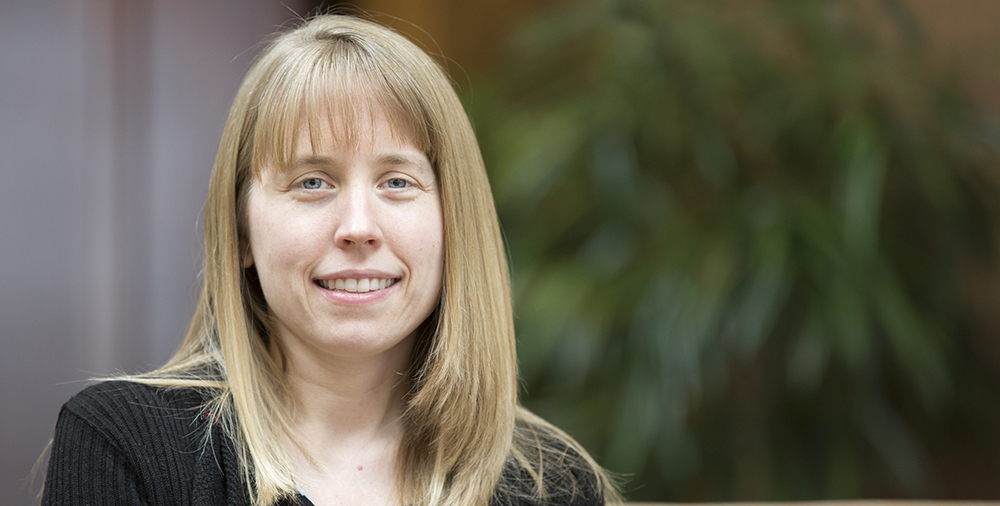This alumna hopes her story will offer hope and inspiration to others.
When Mandy Hallman was just 6 years old, her parents divorced, and her mother began suffering from alcoholism. When she was 10, her family lost their home. After moving from apartment to apartment with their mother, who was struggling to care for herself and her children, Mandy, then 12, and her sister were split up and taken in by grandparents, aunts and uncles.
Mandy and her sister made one last life-changing move later that year. That move was to the Masonic Children’s Home in 1994.
“I was intimidated, scared, angry, hurt and felt resentment,” Mandy recalls. “I didn’t want to be there.”
While Mandy knew her family wasn’t perfect, it was the normal she knew, and she wasn’t looking forward to living in a house full of strangers away from her hometown. Although she had her sister, Mandy’s biggest fear the day she moved to the children’s home was that she’d be there for longer than the school year. Luckily, that first night, her new house mates and house parents welcomed her with open arms and helped her unpack.
From then on, Mandy knew she had a choice. She could close herself off or step back and make the best out of the worst situation. Thankfully, she chose the latter and grew to embrace the children’s home and all it had to offer for the next five years of her life.
“It was the best choice,” Mandy said. “Although they were complete strangers, it was clear that they cared about me. The people at the home give everything for you to become who you want to be.”
Mandy started a new school a few weeks after moving to the children’s home and worked hard to do well academically, with the help of her tutors. She studied Spanish with her house parents and remembers practicing reciting Thomas Beckett at the kitchen table for a literature class. Her friends at the children’s home became more like brothers and sisters, and she created memories that she would carry with her for the rest of her life. Her fondest memories came from trips to the beach, shopping for new school clothes each year and trips to local roller-skating rinks, farmers’ markets and movie theaters.
“I just want to say a big ‘thank you’ to the children’s home for being there when my family couldn’t be,” Mandy said, “and for providing me with not only the basics, but things that I didn’t even know I needed.” These things included emotional support, listening ears and ways for Mandy to grow her self-confidence.
When Mandy was in high school, her mother finished her journey to recovery, and the two built a close relationship. While it was painful, Mandy chose to forgive her mother as she entered into adulthood. “The hurt will always be there, but you have to learn how to forgive,” Mandy says.
Today, Mandy works as an administrative assistant for the Pennsylvania Higher Education Assistance Agency, but her most important 24-hour, seven-day-a-week job is being mom to her three sons, ages 11, 6 and 1. “I try to keep myself working hard because I want to break the cycle,” Mandy says. “I’ve seen how easily a family can be ripped apart.”
Her oldest son is named Mason, a tribute to her time at the Masonic Children’s Home. “It was to commemorate the biggest turning point in my life and say ‘thank you’ in my own special way,” she said.
If there is one thing Mandy always wanted, it was a family of her own, and she gives credit to the children’s home for molding her into the mother she is today. “I strive to be a fantastic mom for my kids,” Mandy says. “I don’t want to fail them. You give up your own life and live for your kids. That’s the way it’s supposed to be.”
Often, Mandy brings her sons to the children’s home so they can see where their mother spent a portion of her childhood. She is proud to tell her children and husband about her time there, and she also opens up about her childhood before that turning point.
“I don’t hold anything back,” Mandy says. “If I wouldn’t have gone through the experience, I wouldn’t be who I am today. The way I raise my kids is an extension of what the children’s home did for me.”
Part of Mandy’s healing comes from sharing her story to help children who are experiencing something similar.
“I want the kids at the home to know that they’re not stuck in this situation,” Mandy said. “This isn’t your life forever. There’s more out there, but you should take advantage of every opportunity the home offers and learn from the people you are surrounded by. Don’t wrap yourself in your own little bubble, even though it’s easy to do.”
Those at the children’s home who invested themselves in Mandy, including the house parents, tutors and support staff, have now become her friends, and she has continued to stay in touch with other children’s home alumni through social media and the alumni association. Through the years, she has also kept children’s home donors in her mind, as she knows her life would be completely different without them.
“Donors are doing the best thing in the world,” Mandy says. “Whatever amount they donate, they’re giving a lot more than they know. These kids will take the experiences they have at the home with them for the rest of their lives.”

